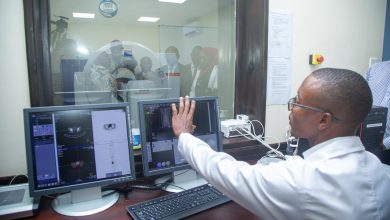Africa’s silent heart crisis, the rising tide of heart failure

MWANZA: When John, a 46-year-old bus driver from Mwanza, began experiencing shortness of breath, he dismissed it as exhaustion from his long shifts on the road.
His ankles often swelled, and climbing stairs left him gasping for air, but he never thought it was serious.
By the time he finally visited Bugando Medical Centre, the doctors gave him a diagnosis that stunned him… advanced heart failure.
John had never heard of the condition. Like many Africans, he believed heart disease was a “Western illness,” something that happened in Europe or America.
Yet, his story reflects a troubling reality: Africa, and Tanzania in particular, is facing a silent epidemic of heart failure, one that is growing rapidly and claiming lives in alarming numbers.
As the world marks World Heart Day today, Tanzanian cardiologists are raising their voices about this hidden crisis.
They warn that unless urgent action is taken, cardiovascular diseases (CVDs), once considered rare on the continent, will continue to overtake infectious diseases as the leading cause of death.
Globally, cardiovascular diseases kill more than 18 million people each year, according to the World Health Organization (WHO). In Africa, doctors say the burden is escalating, fueled by rising cases of hypertension, diabetes, obesity and lifestyle-related risk factors.
Dr. Fredrick Kalokola, an internal medicine and heart failure specialist at Bugando Medical Centre, points to recent findings from an acute heart failure survey across Africa.
ALSO READ: PM stresses regular health check-ups to combat NCDs
“The majority of patients present with severe symptoms, often after years of uncontrolled hypertension, diabetes, or smoking,” he explains.
He adds that late presentation is one of the greatest challenges. Many patients arrive at hospitals when their condition has already advanced, making treatment more complicated and outcomes poorer.
The lack of advanced diagnostic tools such as cardiac catheterization for patients who suffer heart attacks also contributes to high mortality rates.
“The burden can be reduced through timely diagnosis and proper management of hypertension and diabetes,” Dr. Kalokola stresses.
For decades, infectious diseases like malaria, HIV/AIDS and tuberculosis were the continent’s most pressing health threats. But as Dr. Hery Mwandolela (MD, MMed, MSc. Cardiology, FACC) explains, Africa is experiencing a major epidemiological shift.
“Cardiovascular diseases are overtaking infectious diseases as leading causes of death and hospitalization,” he says, adding that research indicates that heart failure accounts for 3–7 percent of all hospital admissions in Sub-Saharan Africa and as much as 30 percent of all cardiovascular-related hospitalizations.
Dr. Mwandolela cautions that the true scale of the problem may be even greater, as many countries lack strong surveillance systems to track cardiovascular cases. He emphasizes three urgent priorities, Early detection and regular screening for hypertension, diabetes, and cholesterol, patient education on warning signs such as breathlessness, fatigue, and swollen legs and strengthening primary healthcare systems to ensure timely diagnosis, follow-up and access to treatment.
One of the greatest dangers of heart failure and other cardiovascular conditions is their silent progression.
Dr. Zahra D. Khan, Consultant Cardiologist at Aga Khan Health Facility, explains:
“Hypertension, diabetes and high cholesterol often develop without obvious symptoms. Millions of people don’t realize they are at risk until they suffer a heart attack, a stroke, or sudden collapse. By then, the damage is already severe.”
She stresses that routine check-ups are essential, even for people who feel healthy. “A simple blood pressure check, cholesterol test, or ECG can detect problems early enough to intervene effectively,” she says.
Dr. Khan insists that prevention and awareness are the keys. “Disease does not discriminate, it doesn’t look at whether you are thin or fat, rich or poor. It can attack anyone. Spending a little on your health today can save you thousands or millions on treatment tomorrow.”
Even when patients are diagnosed, another obstacle looms… sticking to long-term treatment plans.
Studies reveal that nearly half of heart patients stop taking their prescribed medicines within a year. Dr. Sudakshina Ghosh, Consultant Nephrologist at Ampola Regency Hospital, says this is one of the most dangerous habits.
“Feeling better doesn’t mean the disease has gone away,” she warns. “Skipping medicines can have deadly consequences.”
The reasons for non-adherence are many, side effects, high costs, complex medication schedules, or simply the belief that one no longer needs treatment.
Dr. Ghosh emphasizes that patient education and support systems are critical. “Heart medications only work if you take them,” she says. “We need community awareness, reminders and programs that help patients stay consistent.”
While medicines and hospital care are important, doctors stress that prevention begins at home.
“Let food be your medicine,” says Dr. Hussein Wajihi, Consultant Physician and Cardiologist at Shree Hindu Mandal Hospital, quoting Hippocrates.
He recommends simple but powerful changes, more fruits, vegetables, whole grains, legumes, nuts, and healthy fats, less salt, sugar, red meat and processed foods and staying hydrated with water instead of sugary drinks.
In addition, physical activity is crucial. “Thirty minutes of moderate exercise, walking, cycling, or swimming, most days can reduce heart disease risk by up to 35 percent,” Dr. Wajihi explains. The benefits include improved blood pressure, better cholesterol control, weight management, reduced stress and better sleep.
“A healthy heart begins on your plate and grows stronger with every step,” he adds. “Eat smart, move more, live longer.”
As Tanzanian doctors highlight this crisis on World Heart Day, their message is united and urgent… heart disease may be silent, but it is preventable. The path forward requires early detection, stronger health systems, affordable medicines, and lifestyle changes.
Dr. Mwandolela summarizes it simply: “The solution lies in early detection, prevention, lifestyle adjustments, and accessible medications.”
And as Dr. Khan emphasizes… “Every heartbeat counts. Every dose matters. And every lifestyle choice can mean the difference between life and loss.”





